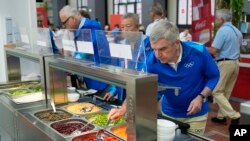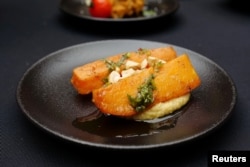Paris Olympics organizers said Monday they have fixed early logistical teething problems after several delegations complained about food and transportation at the Games.
The quality and quantity of food drew criticism from athletes after catering staff rationed breakfast eggs last week.
Organizers had promised fresh produce mostly made in France, with a focus on local and organic products and more vegetarian options. Some demanded more meat, however.
Using over 600 tons of fresh produce provided by Carrefour, catering firm Sodexo is expected to provide an estimated 40,000 meals a day to 15,000 Olympic Village athletes.
"Regarding the food we've had to make some adjustments, which is normal in operations that size, Paris 2024 CEO Etienne Thobois told a news conference.
"There has been a reinforcement in animal proteins with 700 kilos (1,543 pounds) of eggs and a ton of meat (available) to meet the demands of the athletes, who we place at the heart of the Paris 2024 experience."
Six South Korean swimmers preparing for the Olympics moved out of the athletes' village Friday to stay at a hotel near their competition venue, the sport's top national official said.
This was the Korea Swimming Federation's response after two of the swimmers, Kim Woo-min and Hwang Sun-woo, had the previous day complained about a long commute in hot buses.
"At the beginning of the operations we've had some problems concerning the transportation of the athletes, especially before the Games started," Thobois said.
"We've taken measures since then with reserve (buses) to serve the athletes in the best possible way and I think the system is now operating perfectly."
The Australia delegation, with 460 athletes, came prepared by bringing with them more than three tons of tuna, 10,000 muesli bars and 2,400 meat pies, as well as three baristas who expect to make more 20,000 shots of coffee during the Games.
They were, however, happy with their village experience.
"This is a high-quality village," the Australian Olympic Committee (AOC) said in a statement Monday.
"Early teething issues with transport have been resolved and the food is varied and plentiful after some early shortfalls. Quantities have been increased and staff added. Whenever the AOC has provided feedback, changes are made.
"Our accommodation is centrally located with easy access to all the main services within the village including the dining hall."

